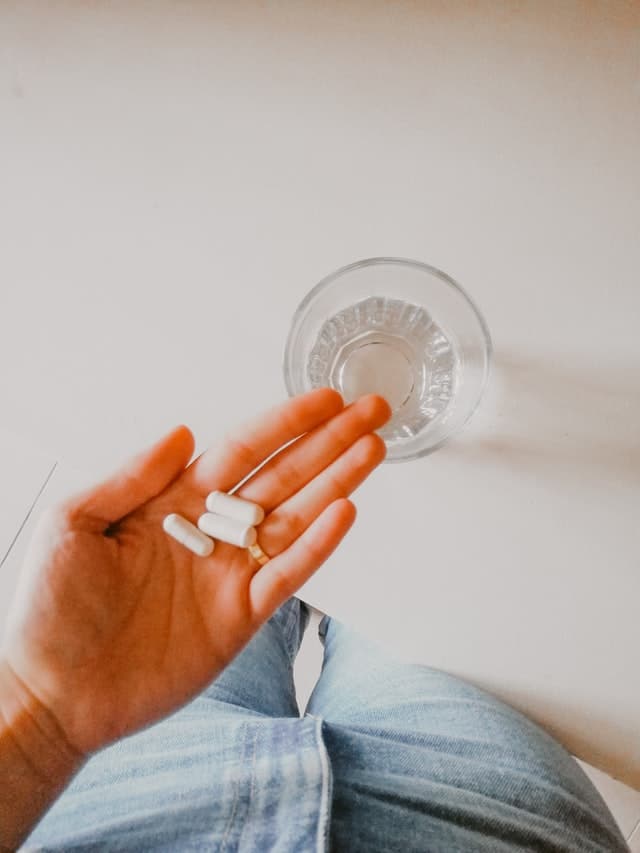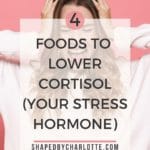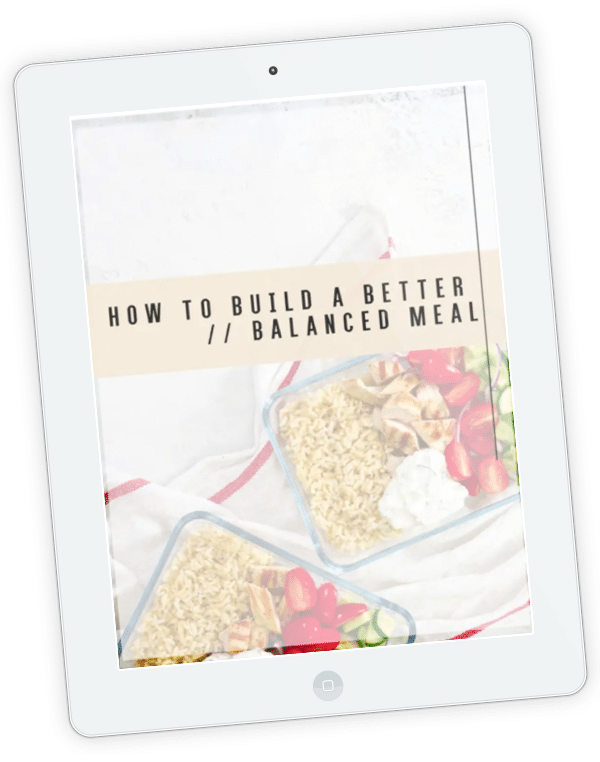Your Ultimate Anti-Stress Diet: Foods that Reduce Cortisol
Feeling stressed? You’re not alone! High cortisol levels can lead to numerous health issues. In this article, I discuss the cortisol basics, high cortisol symptoms, the top foods that reduce cortisol, and supplements to lower cortisol, too!

What is Cortisol?
Cortisol is the body’s primary stress hormone and its release can be triggered by any type of stressor: a late-wake up, a deadline, or actual danger. Whatever the cause, when you hit fight-or-flight mode, your body secretes cortisol.
It’s inherently a good thing because it causes the body to quickly mobilize glucose (aka blood sugar) into the blood by changing blood flow and stimulating the liver to produce glucose. This glucose is meant to fuel the muscles and give the body a natural energy boost so that you can quickly respond to that stressor.
However, when your cortisol levels are constantly elevated from living life stressed out, it becomes a not-so-good-thing.
High Cortisol Symptoms
Chronic high cortisol levels as a result of chronic stress can lead to numerous issues. Symptoms of high cortisol levels include:
- weight gain and changes in fat distribution
- fatigue
- poor sleep
- digestive issues
- headaches
- difficulty concentrating
- increased blood pressure
- mood changes
- menstrual cycle changes
- lowered immune function
Fortunately, there are many things you can do to reduce cortisol levels naturally. Beyond the obvious, like prioritizing sleep, engaging in exercise regularly (but not at an excessive level), and engaging in relaxation techniques (i.e. yoga, meditation) regularly, you can also make changes to your diet to help support healthy cortisol levels.
How to reduce cortisol through diet
A diet low in added sugars and other refined carbs is your first line of defense here. Added sugar-rich foods and other refined carbs lack one big thing: fiber. Fiber is what helps prevent those drastic blood sugar swings that result in moodiness, fatigue, and hanger, all of which can leave you feeling stressed.
Sure, refined carb-rich foods may provide very temporary, short-term stress relief (we don’t call these “comfort foods” for nothing), but excess intake of them can contribute to chronic inflammation and stress, and can impair your ability to handle stress. In fact, a diet high in sugar has been linked to cognitive impairments and emotional disorders such as anxiety and depression.

Foods that Reduce Cortisol Levels
I mentioned a few things to limit in a zen-friendly diet, but are there any things you can add to your diet to help lower cortisol levels? Yes!
Here are my top foods to include in the diet to help keep cortisol levels in check:
Carb-Rich Foods
If you’re a “carbophobe”, it could be affecting your stress levels and sleep. Your body treats low blood sugar as a stressor, causing cortisol levels to rise. So, eating carbs can help lower cortisol levels and consequently, not eating enough carbs can increase them.
Plus, carbs help clear the way for the amino acid tryptophan to enter the brain which ultimately helps us produce melatonin. Yep, that’s that hormone that promotes good sleep. So, by not eating enough carbs, you could be hurting your sleep, too.
It doesn’t end there, because the body perceives lack of sleep as a stressor, too, which puts you right back on the cortisol train. That’s a train we’d like to stay off of thank you very much.
I’m not giving you the green light to consume any and all carbs ad libitum. As you now know, eating too many refined carbs could make stress worse. However, getting a lot of unrefined, fiber-rich, complex carb sources in the diet can help you control blood sugar and therefore cortisol levels. These include fruits, starchy veggies, whole and ancient grains, and legumes (i.e. beans, chickpeas, and lentils).
Magnesium-Rich Foods
Did you know nearly half of Americans aren’t meeting the recommended intake for magnesium? One reason being, drum roll please… stress! When experiencing stress and elevated cortisol levels, the body loses more magnesium than usual through urine and sweat. This results in a vicious cycle: stress causes magnesium depletion and magnesium deficiency then amplifies stress.
But don’t worry, there seems to be an inverse relationship between cortisol and magnesium levels—the higher the magnesium, the lower the cortisol.
You can increase your intake of magnesium by including these magnesium-rich foods in the diet:
- Almonds and almond butter
- Avocados
- Black beans
- Cashews and cashew butter
- Dark chocolate
- Dark leafy greens, like spinach
- Peanuts and peanut butter
- Pumpkin seeds
- Whole grains, like brown rice and quinoa
- Yogurt and kefir
Try this Instant Pot Chicken Burrito Bowls recipe for an easy weeknight magnesium-rich meal!
Omega-3-Rich Foods
Omega-3s are polyunsaturated good-for-you fats that play a variety of important roles in your body.
Low blood levels of omega-3s have been associated with increased cortisol levels. Luckily, the relationship is likely bidirectional, meaning that increasing your omega-3 intake could help to reduce cortisol levels. Although we don’t exactly know the how and why, research suggests it has something to do with their inflammation balancing effects.
The three main types of omega-3s are EPA, DHA, and ALA. EPA and DHA are found mostly in fatty fish and some other seafood, which is why the Dietary Guidelines recommend consuming two servings of seafood per week.
ALA is found in plant foods, specifically flaxseeds and flax oil, chia seeds, pumpkin seeds, and walnuts. ALA isn’t effective in the body until it’s converted to EPA or DHA; however, only a small amount end ups converting to these biologically active forms. That’s why it’s important to get EPA and DHA in the diet.
Prebiotic-Rich Foods
It’s more than just a “gut feeling” – the gut-brain connection is no joke, and the two are in constant communication with one another. Although the exact mechanisms are not yet fully understood, we know that stress and high cortisol levels can negatively impact the composition and activity of the gut microbiome, and in turn, an imbalanced gut microbiome can manifest itself as anxiety and stress.
The study also found that people who took the prebiotics had lower levels of cortisol in their saliva when they woke up in the morning, compared with people who took a placebo.
One of the best ways to support a diverse and thriving gut microbiome (besides chilling out)? Eat more prebiotic-rich foods! Prebiotics are essentially “fuel” for your good gut bacteria, to help them survive and thrive. One study found that individuals who took a prebiotic supplement had lower levels of cortisol in their saliva when they woke up in the morning compared to those who took a placebo supplement.
Although you can obtain prebiotics from supplements and powders, I encourage you to take a food-first approach here because the grocery store isn’t short on prebiotics. Prebiotic-rich foods include:
- Veggies: artichokes, asparagus, beetroot, Brussels sprouts, chicory root, dandelion greens, fennel bulb, garlic, green peas, leek, mushrooms, onion, savoy cabbage, seaweed, shallots, snow peas
- Fruits: apples, bananas, dates, figs, grapefruit, nectarines, persimmon, watermelon
- Legumes: beans, chickpeas, lentils, soybeans, and soy products
- Nuts and seeds: cashews, flax seed, pistachios, walnuts
- Grains: barley, oats, rye, wheat bran
I discuss all things prebiotics, probiotics and fermented foods, gut health and more in my new book The Plant-Forward Solution: Reboot Your Diet, Lose Weight & Build Lifelong Health!
Probiotic-Rich Foods
Another way to support a healthy, happy, diverse, and stress-resilient gut microbiome? Probiotic-rich foods! Probiotics are live microorganisms (like bacteria) that, when ingested, confer a health benefit to the host (aka you). They are often the same as or similar to those that naturally live in your body, which is why you’ll often hear people refer to the good bacteria native to the gut as “probiotics,” too.
One study found that medical students who drank fermented, probiotic-rich milk for 8 weeks while preparing for a big exam had lower day-of-exam cortisol levels than the medical students who drank non-fermented milk.
Your best natural food sources of probiotics are fermented and cultured foods, like:
- Culture cottage cheese
- Kefir
- Kimchi
- Miso
- Sauerkraut
- Yogurt
Give this Kimchi Fried Cauliflower Rice recipe a try!

Supplements to Lower Cortisol
As a dietitian, I like to take a food first approach when it comes to obtaining the nutrients you need. But I understand that for many people, this can be a challenge.
If you think you’re missing out on one or more of the above, you can certainly consider a high-quality supplement.
- For magnesium: Magnesium glycinate (or biglycinate) and magnesium citrate are two common forms that are both well absorbed. Magnesium citrate is commonly used to treat constipation whereas magnesium glycinate is often used for its calming and relaxing effects, so I’d look for a supplement with the latter.
- For omega-3’s: Look for an omega-3 fish oil supplement that contains around a combined 300 – 500 mg of EPA and DHA. You’ll find these numbers on the label. If you’re avoiding fish products, look for an algae-based omega-3 supplement.
- For probiotic: When choosing a probiotic supplement for general use, look for one with at least a few different strains (look for Lactobacillus and Bifidobacterium) and at least a few billion CFUs (colony forming units).
Ashwagandha and Cortisol
Ashwagandha—an ancient, adaptogenic herb—is another supplement that’s often mentioned when discussing supplements to lower cortisol and stress. Preliminary research supports ashwagandha’s potential as a natural therapeutic for stress and anxiety. In fact, one study found that Ashwagandha supplementation reduced psychological and physiological markers of stress, improved mental well-being, and reduced serum cortisol level and food cravings in men and women under chronic stress.
Bottom Line—Foods that Reduce Cortisol
Cortisol is an important hormone that helps us deal with stressful situations. However, you want to avoid constantly elevated levels as they can be harmful to your health.
If you’re living life stressed out, including foods that reduce cortisol in the diet, like unrefined, carb-rich foods, gut supporting foods, and magnesium- and omega-3-rich foods, can help… and certainly can’t hurt!
P.S. I talk all about the main cortisol-lowering foods, like quality carbs, omega-3-rich foods, and pre- and probiotic-rich foods, and how to incorporate them into a diet that supports optimal health (including meal plans, recipes, and more) in my new book The Plant-Forward Solution: Reboot Your Diet, Lose Weight & Build Lifelong Health by Eating More Plants & Less Meat, available now!





